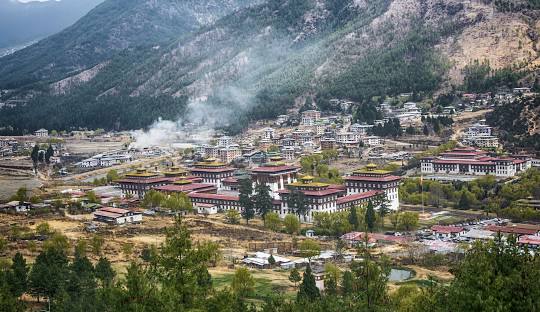Thimphu, Bhutan: A Serene Escape into the Heart of the Himalayas 🏞️✨
Thimphu: A Harmonious Blend of Tradition and Tranquility
Nestled deep within the majestic Himalayas, Thimphu is the capital city of Bhutan, known for its serene landscapes, traditional culture, and spiritual atmosphere. A place where ancient customs and modernity intertwine, Thimphu offers an unparalleled experience for those seeking both peace and adventure.
Thimphu's charm lies not only in its natural beauty but also in its ability to maintain a deep sense of Buddhist spirituality amidst the growing urbanization. Whether you're wandering through ancient monasteries, visiting traditional markets, or exploring the lush valleys and mountain peaks surrounding the city, Thimphu provides a journey into both the soul and the spectacular beauty of the Kingdom of Bhutan.
🌟 Top Attractions in Thimphu
1. Tashichho Dzong 🏯
The Tashichho Dzong, also known as the Fortress of the Glorious Religion, is one of Bhutan's most iconic landmarks. Situated on the banks of the Wang Chu River, this stunning fortress serves as the seat of the Bhutanese government and the residence of the king’s throne room. Its architecture and beautiful gardens make it a must-see in Thimphu.
Rating: ⭐ 10/10
Best for: History lovers, architecture enthusiasts, and those interested in Bhutanese culture.
2. Buddha Dordenma Statue 🗿
Standing at 169 feet, the Buddha Dordenma is one of the tallest Buddha statues in the world, and it overlooks Thimphu from a hilltop. Made of bronze and gold, it offers not just a spiritual experience but also one of the most scenic views of the surrounding valley. The site also includes a peaceful meditation hall, perfect for reflecting in this serene atmosphere.
Rating: ⭐ 9.9/10
Best for: Spiritual seekers, photographers, and those in search of breathtaking views.
3. National Memorial Chorten 🕍
The National Memorial Chorten, built in honor of the third king of Bhutan, is a striking Tibetan-style stupa located in the heart of Thimphu. It's a spiritual hub where locals gather to pray and circumambulate the stupa. The Chorten's beautiful murals and the steady hum of prayer wheels create an atmosphere of serenity.
Rating: ⭐ 9.8/10
Best for: Cultural explorers, spiritual seekers, and anyone looking for peace and reflection.
4. Folk Heritage Museum 🏡
The Folk Heritage Museum provides a fascinating look into the traditional lifestyle of Bhutanese families. Set in a restored traditional farmhouse, the museum showcases artifacts, tools, and displays that bring Bhutan's rural heritage to life. The museum is an excellent place to gain insight into Bhutan’s unique cultural practices.
Rating: ⭐ 9.7/10
Best for: History buffs, culture lovers, and those looking to explore traditional Bhutanese life.
5. Motithang Takin Preserve 🦌
The Motithang Takin Preserve is a wildlife reserve where you can see the Takin, Bhutan's national animal, roaming freely in a natural environment. The reserve also offers picturesque walking trails through lush forest areas and is an excellent place for nature lovers to explore.
Rating: ⭐ 9.6/10
Best for: Animal lovers, nature enthusiasts, and those who enjoy hiking.
🍴 What to Eat in Thimphu
Thimphu's cuisine is an expression of Bhutan's rich cultural heritage, with an emphasis on spices, cheese, and fermented foods. The city offers a variety of traditional dishes that are sure to tantalize your taste buds.
-
Ema Datshi – A spicy and cheesy dish made with chilies and cheese, it’s a must-try for anyone visiting Bhutan.
-
Phaksha Paa – A hearty dish made with pork, radishes, and a mix of spices.
-
Jasha Maru – A spicy minced chicken dish served with rice and vegetables.
-
Red Rice – A staple food in Bhutan, red rice is usually served with most meals.
-
Suja – Traditional butter tea made from yak butter, tea leaves, and salt. This warming beverage is a staple among Bhutanese people.
Top spots: Simply Bhutan, The Bhutan Kitchen, and Zhiwa Ling Asylum.
🏨 Where to Stay in Thimphu
-
Taj Tashi – A luxury hotel that combines modern amenities with traditional Bhutanese architecture. The hotel offers stunning views of the surrounding mountains and is renowned for its hospitality and service.
-
Le Meridien Thimphu – Another top-tier option, offering elegant rooms, a spa, and a central location for easy access to Thimphu’s attractions.
-
Druk Hotel – A cozy, mid-range hotel offering traditional Bhutanese hospitality and comfortable rooms in the heart of Thimphu.
-
Bumthang Hotel – A budget-friendly hotel with a welcoming atmosphere, offering basic amenities and a convenient location.
🧭 Insider Travel Tips
-
Best Time to Visit:
The best time to visit Thimphu is during fall (September to November) when the weather is pleasant and the Thimphu Tshechu Festival takes place. The spring months (March to May) are also a great time to visit, as the weather is mild and the flowers are in bloom. -
Getting Around:
Thimphu is a small and easy-to-navigate city. Taxis and private vehicles are available, but walking is the best way to explore the city at a leisurely pace. Bicycles are also a popular mode of transportation. -
Local Tip:
Bhutan is a country with a strong sense of tradition and spirituality, so it's important to be respectful of local customs. Dress modestly when visiting religious sites, and be aware of cultural practices such as removing your shoes before entering temples.
🌍 Final Thoughts: Thimphu – A Serene Himalayan Sanctuary
Thimphu is a city that invites visitors to slow down and immerse themselves in its tranquil environment. Whether you're visiting its peaceful monasteries, exploring the city's vibrant markets, or hiking the surrounding Himalayan mountains, Thimphu offers an experience of serenity and cultural richness that is unlike anywhere else in the world.
📸 Pro Tip:
For a unique perspective of Thimphu, head to the Dochula Pass, located just outside the city. Here, you’ll find 108 stupas with panoramic views of the Himalayas – it’s an unforgettable experience for photographers and nature lovers alike.
News You Should See
Latest Blogs




